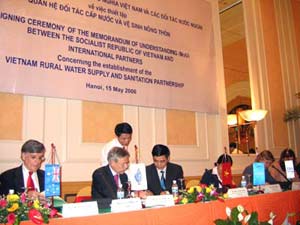 |
|
14 partners including international organizations and non-governmental organizations participated in the signing ceremony |
On May 15, the Ministry of Agriculture and Rural Development (MARD), along with donors and non-governmental organizations, signed a Memorandum of Understanding to establish the Rural Water and Sanitation Partnership and also set up a coordinating office under MARD.
Minister of MARD Cao Duc Phat and ambassadors and representatives of international organizations in Vietnam, such as the World Bank (WB), the East Asia and Pacific Clean Water and Sanitation Program, UNICEF Vietnam, the Asian Development Bank, and the embassies of Australia, Denmark, Sweden, the Netherlands, among others, participated in this memorandum signing.
The Rural Water and Sanitation Partnership will commence operations from May 2006, focusing on supporting policy dialogue, information sharing, and research at local, national, and regional levels. Additionally, the partnership will assist in implementing sector initiatives agreed upon in the partnership program framework and promote sector engagement through a common trust fund.
Klaus Rohland, the WB Director in Vietnam, stated that the goal of the partnership is to contribute to poverty alleviation, increase income for rural residents, and protect the environment by more effectively implementing the National Strategy for Rural Water Supply and Sanitation, as well as other related strategies and government policies.
The establishment of the partnership aims to enhance the efficient use of resources in the rural water and sanitation sector by building a coordination mechanism to harmonize support for national environmental program policies concerning water supply, rural sanitation, and other programs.
According to Jesper Morch, UNICEF Representative in Vietnam, currently, over 1 billion people worldwide lack access to clean water, and 2.6 billion do not have access to sanitation programs. In Vietnam, water resources are limited and are currently under severe pressure due to widespread pollution and excessive water use.
This is a cumulative result of factors such as population explosion, increased economic activities, and inadequate management efforts. Additionally, the disparity in access to water between provinces and cities has become more pronounced. The rate of households with access to clean water in urban areas is 78%, while in rural areas, this rate is only 44%.
The current challenge is immense as Vietnam sets the goal of providing 85% of the overall clean water demand by 2010 and 100% by 2020.


















































